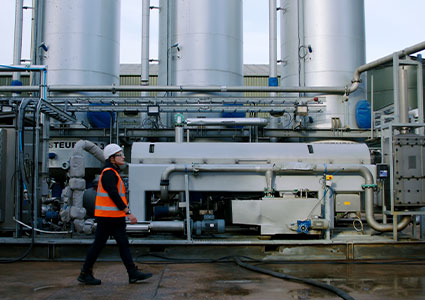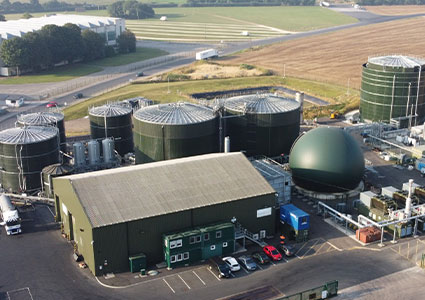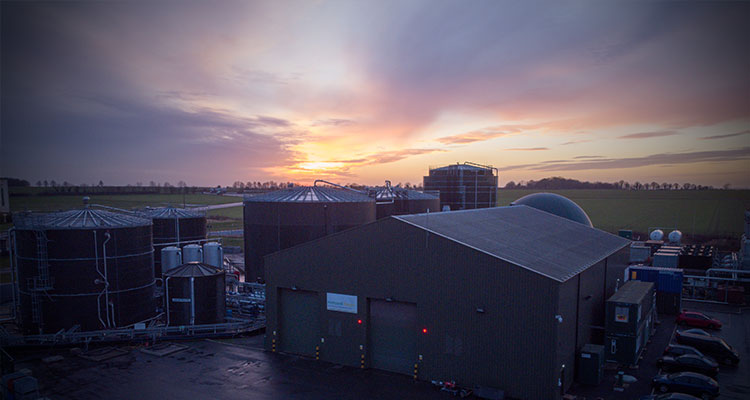How BioteCH4 is revolutionizing waste management through innovative processes
With strategically located sites across the UK and a strong reputation in the food waste and anaerobic digestion sector, BioteCH4 provides biological support, and feedstock supply to other operators within the industry. Its vast expertise and knowledge not only enable the company to deal with food waste produced throughout the UK, but also to manage any quantity of waste required through a tailored approach. As a food waste anaerobic digestion business, BioteCH4’s crucial services effectively take the stress out of waste management, from waste collection services to the removal of oil-based waste. Lee Dobinson, Chief Commercial Officer, shares a detailed account of the organization’s multifaceted structure and operations.
“When BioteCH4 was founded in 2009, we operated a food production business that was looking for more sustainable power options. To that end, we built an anaerobic digestion facility to use our food waste to power operations and offer the same services to other local companies. In late 2011, we began generating local renewable energy, marking the inception of BioteCH4,” he opens.
anaerobic digestion facility to use our food waste to power operations and offer the same services to other local companies. In late 2011, we began generating local renewable energy, marking the inception of BioteCH4,” he opens.
This turning point was the company’s first step towards the tremendous success it is currently experiencing. Lee lays out the phases of expansion of BioteCH4 over time. “Since then, we have sold the food production business and transformed into the renewable energy business we are today, using food waste to generate energy. Over the next few years, we built six more facilities, bringing our current total to seven across the UK. Of these facilities, five are anaerobic digestion plants while the other two serve as processing facilities. I believe that we process more food waste than any other business in the country. Last year, we processed over 600,000 tons of food waste, generating about 283,000 megawatt hours (MWh) of energy, which is enough to power more than 30,000 homes.
“In addition to our core power generation activities, we operate a manufacturing business called STORTEC, which is designed to build infrastructure on our sites as well as providing us with an in-house ability to build tanks across our sites, as and when needed. STORTEC also carries out significant work in the water industry, specializing in tanks, and possesses a patent on a biodome that holds gas. On the side of that, we own a commodities broker that trades fats, oils, and greases, and we upgrade used cooking oil to a higher value so that we can sell it into the biodiesel and biofuels markets,” he elaborates.
Sustainable solutions
Lee delves deeper into BioteCH4’s cooking oil transformation operations, which have been happening since late 2023 across its facilities. “Using an oil decanter, we extract edible oils from our food waste processing activities and monetize them by selling them into the biofuels market. The key driver for the creation of this operation was our desire to find another source of long-term, sustainable income that would not interrupt our anaerobic digestion process. It also has major environmental benefits. To do this, we partnered with a technology company to implement a process that skims the oil content out of our feedstock rather than letting it run through our biogas process. The resulting edible oil can then be sold into the biofuels market, which is under pressure to make more sustainable aviation fuel and biodiesel. One of the best ways to make these fuels is to utilize used cooking oils in the process, which is highly sustainable because it is being produced from waste. As a result, the market can get closer to meeting its targets for sustainable aviation fuel. In the UK, the target is for 30 percent of air travel to be powered by sustainable fuel, but meeting this goal would require significantly more oil than the industry currently produces,” he enlightens.
To enable the wider processing of edible oils, BioteCH4 is currently in talks to install the same machinery in the plants of other anaerobic digestion operators. Alongside this, the company has recently received planning permission for a new anaerobic digestion facility in Lincolnshire, which is set to amplify its positive impact on the environment. “This plant will allow us to incorporate that extra material but also to blend it with the waste we’re already processing throughout the county,” continues Lee.
 “With a two-year long planning process, the project has taken some time to get on its feet. Nonetheless, we are delighted to say that we have received no objections to the facility at all. We expect to begin construction on the new plant in the near future, but the wait will have been worth it. Indeed, the planning consent is for up to 200,000 tons of food waste per annum, which will place us in a good position to handle increased amounts of food waste, as arisings are set to increase in the local area over the next few years. It will also benefit the farmland around us, because it will essentially double the amount of land we will be able to fertilize within Lincolnshire, further reducing the need for artificial fertilizers in the county,” he adds.
“With a two-year long planning process, the project has taken some time to get on its feet. Nonetheless, we are delighted to say that we have received no objections to the facility at all. We expect to begin construction on the new plant in the near future, but the wait will have been worth it. Indeed, the planning consent is for up to 200,000 tons of food waste per annum, which will place us in a good position to handle increased amounts of food waste, as arisings are set to increase in the local area over the next few years. It will also benefit the farmland around us, because it will essentially double the amount of land we will be able to fertilize within Lincolnshire, further reducing the need for artificial fertilizers in the county,” he adds.
Optimizing operations
Turning to the future, Sharon Foster, Group Marketing and Brand Manager, reveals what Food Chain readers can expect from BioteCH4 for the remainder of 2024. “In September, we will be speaking at the ESS RWM (Resource and Waste Management) Expo and exhibiting at the Greater Lincolnshire LEP Conference. Still in terms of events, we will be focused on preparing for upcoming events in 2025, where we will be exhibiting and showcasing our business early next year. Notably, we are set to attend the LARAC (Local Authority Recycling Advisory Committee) conference in October 2024. Every year, we support LARAC’s key events as they provide strategic opportunities for us to connect and catch up with existing and new customers. These events also offer us great opportunities to stay up to date on the most recent developments in the local authority market and network with the industry professionals who will be present. Moreover, the awards ceremony at LARAC’s event will be a nice way to celebrate successes in the industry,” she enthuses.
Further afield, Lee anticipates BioteCH4 to have gone through another phase of growth in five years’ time, whether through acquisition or natural growth. “By that point, I believe that the UK will have been recycling food waste for a few years, in line with legislation. Therefore, we will be working to optimize our food waste recycling processes through innovation with our supply chain. This includes working with local authorities and our commercial supply chain to drive further reductions in waste outputs. I would like to think that in five years’ time, we will have evolved and adopted more innovative ways to manage some of our processes. For example, it is reasonable to anticipate that carbon dioxide capture will be commercially viable by then. In the same vein, I am hopeful that it will be commercially viable to power the trucks that deliver food waste to us with the biogas we produce on our sites,” he concludes.
Through a steadfast dedication to innovation and optimizing processes, BioteCH4 has established itself as a strong leader in the anaerobic digestion field and is well-positioned to continue inspiring the industry with solutions that support the UK’s waste reduction goals.
